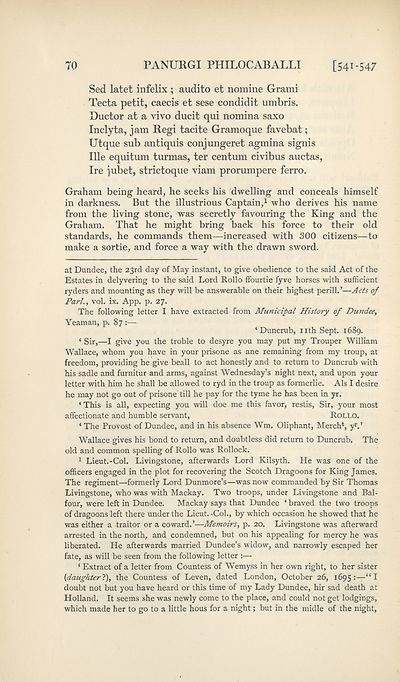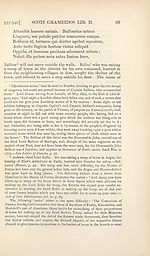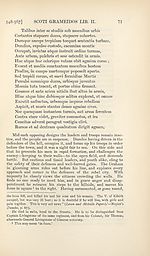Series 1 > Grameid: an heroic poem descriptive of the campaign of Viscount Dundee in 1689, and other pieces
(141) Page 70
Download files
Complete book:
Individual page:
Thumbnail gallery: Grid view | List view

70
PANURGI PHILOCABALLI
[541-547
Sed latet infelix; audito et nomine Grami
Tecta petit, caecis et sese condidit umbris.
Ductor at a vivo ducit qui nomina saxo
Inclyta, jam Regi tacite Gramoque favebat;
Utque sub antiquis conjungeret agmina signis
Ille equitum turmas, ter centum civibus auctas,
Ire jubet, strictoque viam prorumpere ferro.
Graham being heard, he seeks his dwelling and conceals himself
in darkness. But the illustrious Captain,1 who derives his name
from the living stone, was secretly favouring the King and the
Graham. That he might bring back his force to their old
standards, he commands them—increased with 300 citizens—to
make a sortie, and force a way with the drawn sword.
at Dundee, the 23rd day of May instant, to give obedience to the said Act of the
Estates in delyvering to the said Lord Rollo ffourtie fyve horses with sufficient
ryders and mounting as they will be answerable on their highest perill.’—Arts of
Pari., vol. ix. App. p. 27.
The following letter I have extracted from Municipal History of Dundee,
Yeaman, p. 87 :—
‘Duncrub, nth Sept. 1689.
‘ Sir,—I give you the treble to desyre you may put my Trouper William
Wallace, whom you have in your prisone as ane remaining from my troup, at
freedom, providing he give beall to act honestly and to return to Duncrub with
his sadle and furnitur and arms, against Wednesday’s night next, and upon your
letter with him he shall be allowed to ryd in the troup as formerlie. Als I desire
he may not go out of prisone'till he pay for the tyme he has been in yr.
‘This is all, expecting you will doe me this favor, restis, Sir, your most
affectionate and humble servant, Rollo.
‘ The Provost of Dundee, and in his absence Wm. Oliphant, Merch*, yr.’
Wallace gives his bond to return, and doubtless did return to Duncrub. The
old and common spelling of Rollo was Rollock.
1 Lieut.-Col. Livingstone, afterwards Lord Kilsyth. He was one of the
officers engaged in the plot for recovering the Scotch Dragoons for King James.
The regiment—formerly Lord Dunmore’s—was now commanded by Sir Thomas
Livingstone, who was with Mackay. Two troops, under Livingstone and Bal¬
four, were left in Dundee. Mackay says that Dundee ‘ braved the two troops
of dragoons left there under the Lieut.-Col., by which occasion he showed that he
was either a traitor or a coward.’—Memoirs, p. 20. Livingstone was afterward
arrested in the north, and condemned, but on his appealing for mercy he was
liberated. He afterwards married Dundee’s widow, and narrowly escaped her
fate, as will be seen from the following letter :—
‘ Extract of a letter from Countess of Wemyss in her own right, to her sister
(daughterl), the Countess of Leven, dated London, October 26, 1695“ I
doubt not but you have heard or this time of my Lady Dundee, hir sad death at
Holland. It seems she was newly come to the place, and could not get lodgings,
which made her to go to a little hous for a night; but in the midle of the night,
PANURGI PHILOCABALLI
[541-547
Sed latet infelix; audito et nomine Grami
Tecta petit, caecis et sese condidit umbris.
Ductor at a vivo ducit qui nomina saxo
Inclyta, jam Regi tacite Gramoque favebat;
Utque sub antiquis conjungeret agmina signis
Ille equitum turmas, ter centum civibus auctas,
Ire jubet, strictoque viam prorumpere ferro.
Graham being heard, he seeks his dwelling and conceals himself
in darkness. But the illustrious Captain,1 who derives his name
from the living stone, was secretly favouring the King and the
Graham. That he might bring back his force to their old
standards, he commands them—increased with 300 citizens—to
make a sortie, and force a way with the drawn sword.
at Dundee, the 23rd day of May instant, to give obedience to the said Act of the
Estates in delyvering to the said Lord Rollo ffourtie fyve horses with sufficient
ryders and mounting as they will be answerable on their highest perill.’—Arts of
Pari., vol. ix. App. p. 27.
The following letter I have extracted from Municipal History of Dundee,
Yeaman, p. 87 :—
‘Duncrub, nth Sept. 1689.
‘ Sir,—I give you the treble to desyre you may put my Trouper William
Wallace, whom you have in your prisone as ane remaining from my troup, at
freedom, providing he give beall to act honestly and to return to Duncrub with
his sadle and furnitur and arms, against Wednesday’s night next, and upon your
letter with him he shall be allowed to ryd in the troup as formerlie. Als I desire
he may not go out of prisone'till he pay for the tyme he has been in yr.
‘This is all, expecting you will doe me this favor, restis, Sir, your most
affectionate and humble servant, Rollo.
‘ The Provost of Dundee, and in his absence Wm. Oliphant, Merch*, yr.’
Wallace gives his bond to return, and doubtless did return to Duncrub. The
old and common spelling of Rollo was Rollock.
1 Lieut.-Col. Livingstone, afterwards Lord Kilsyth. He was one of the
officers engaged in the plot for recovering the Scotch Dragoons for King James.
The regiment—formerly Lord Dunmore’s—was now commanded by Sir Thomas
Livingstone, who was with Mackay. Two troops, under Livingstone and Bal¬
four, were left in Dundee. Mackay says that Dundee ‘ braved the two troops
of dragoons left there under the Lieut.-Col., by which occasion he showed that he
was either a traitor or a coward.’—Memoirs, p. 20. Livingstone was afterward
arrested in the north, and condemned, but on his appealing for mercy he was
liberated. He afterwards married Dundee’s widow, and narrowly escaped her
fate, as will be seen from the following letter :—
‘ Extract of a letter from Countess of Wemyss in her own right, to her sister
(daughterl), the Countess of Leven, dated London, October 26, 1695“ I
doubt not but you have heard or this time of my Lady Dundee, hir sad death at
Holland. It seems she was newly come to the place, and could not get lodgings,
which made her to go to a little hous for a night; but in the midle of the night,
Set display mode to:
![]() Universal Viewer |
Universal Viewer | ![]() Mirador |
Large image | Transcription
Mirador |
Large image | Transcription
Images and transcriptions on this page, including medium image downloads, may be used under the Creative Commons Attribution 4.0 International Licence unless otherwise stated. ![]()
| Scottish History Society volumes > Series 1 > Grameid: an heroic poem descriptive of the campaign of Viscount Dundee in 1689, and other pieces > (141) Page 70 |
|---|
| Permanent URL | https://digital.nls.uk/126597249 |
|---|
| Attribution and copyright: |
|
|---|
| Description | Over 180 volumes, published by the Scottish History Society, containing original sources on Scotland's history and people. With a wide range of subjects, the books collectively cover all periods from the 12th to 20th centuries, and reflect changing trends in Scottish history. Sources are accompanied by scholarly interpretation, references and bibliographies. Volumes are usually published annually, and more digitised volumes will be added as they become available. |
|---|


